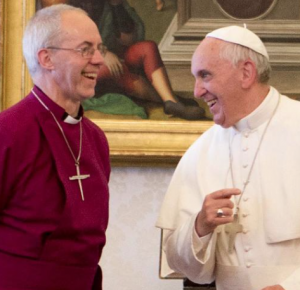This past weekend I was part of the leadership team for the youth track of a Christian mission festival called GOfest. I’ve blogged about it before. One of the major thrusts of what we did was try to help young people discover the part God has created them for in His mission and purposes for the world.
One thing the New Testament is pretty clear on is this. All Christians have gifts, and we should use them.

Gifts in action!
I get very excited when I see people discovering their gifts and using them. There is such potential to be released!
At last year’s GOfest, one of our young people (she was 16) discovered gifts of mercy and a passion to see justice for those who are oppressed. Since then, she’s started a youth justice movement that runs campaigns and gets petitions signed around areas of injustice in the world. (Check out the group on Twitter, . She’s also hopefully going to write something on here for me, too!)
That is exciting! We didn’t tell them to start a group because we thought it would be a good idea. One person discovered gifts and passions, and from that she led into something amazing! I am so excited to see what God is doing and will do through that act of obedience and commitment to serve.
When we take our gifts and use them, big things can happen! But there are two things we really need to avoid if we want to see that happen, two traps we Christians can easily fall into.
Pretending we have gifts we don’t
The first danger is this: pretending we’re gifted in areas we aren’t. Lots of effort can get poured into trying to do things that God has never called us to do because we feel we ought or because we don’t want to look bad in front of others who are good at it.
Of course sometimes it isn’t a conscious thing. Sometimes we suffer from this very ‘nice’ idea that everyone should get a go at everything. Let’s create a rota and make sure everyone gets a fair shot at it all. Otherwise it wouldn’t be fair, right? But the product of that is this: most of the time, most people don’t do what God has gifted them to do. What a waste!
Yes, we have to explore some gifts to see if we might have them. Yes, we can grow in our gifts so if our first go isn’t amazing it doesn’t mean we never consider it again. And yes, just because I don’t have the gift of, say, evangelism it doesn’t mean I should never seek to share my faith (the same goes with the gift of giving!). There are times to ‘branch out’.
But our norm, our centre, our focus should be pursuing full throttle the gifts that God has really given us. If the whole church were truly released to discover and walk in the gifting God had given, what potential!
Pretending we don’t have gifts we do
Then there’s the opposite. Isn’t it really a little arrogant to say “I have the gift of ______, so let me use it.” When people do that, isn’t it likely to make others feel worse? Shouldn’t we be humble about our gifts? We shouldn’t put ourselves forward so much – that’s just pride, right?
I have to confess, this is something I have struggled with myself. It may be a thoroughly British thing. We Brits like to be modest.
But hiding or keeping quiet about our gifts isn’t modesty at all. At best it’s false modesty, but at worst it’s pride.

How is it really pride? Well, the only reason we’d ever feel that talking about our gifts was arrogant is if – deep down – we believe they’re a result of our own ability. But they’re not. They’re gifts. It isn’t arrogant to tell someone about a gift you’ve been given. It doesn’t glorify you – it glorifies the Giver!
If someone is a leader, let them know that, say that, and be that. Let them lead you. If someone is a prophet, value the insight and words God has given them. Listen to them. If someone is a servant, don’t demean their gift by telling them to let someone else sweep the floor this time. Let them serve you. Of course thank all these people. Honour them publicly and privately.
It’s taken me quite a while, but I am now quite comfortable telling people what gifts I believe God has given me. I’m done pretending.
What about you?



 This isn’t all there is.
This isn’t all there is.

 But just because we Christians cannot demand our government act in a certain way, we ourselves must do so. It’s easy to point fingers, but what about us?
But just because we Christians cannot demand our government act in a certain way, we ourselves must do so. It’s easy to point fingers, but what about us?
 It’s good for our communities
It’s good for our communities

 There are folk who advocate sharing faith by actions and lifestyle instead of words. While the ‘not simply’ in this verse certainly means words aren’t all we need, it’s a stretch to say we don’t need them at all.
There are folk who advocate sharing faith by actions and lifestyle instead of words. While the ‘not simply’ in this verse certainly means words aren’t all we need, it’s a stretch to say we don’t need them at all. He lived alongside them. He became their friend. He shared life. The ups and the downs. He walked with them, hand in hand. He chose to commit to them, and in doing so became a model of what a life lived with Jesus looks like. This was real relationship.
He lived alongside them. He became their friend. He shared life. The ups and the downs. He walked with them, hand in hand. He chose to commit to them, and in doing so became a model of what a life lived with Jesus looks like. This was real relationship.




